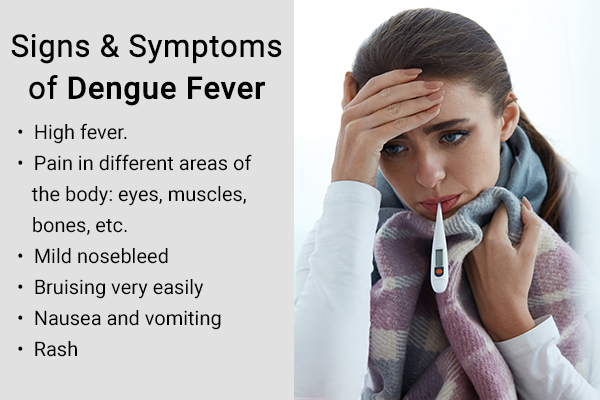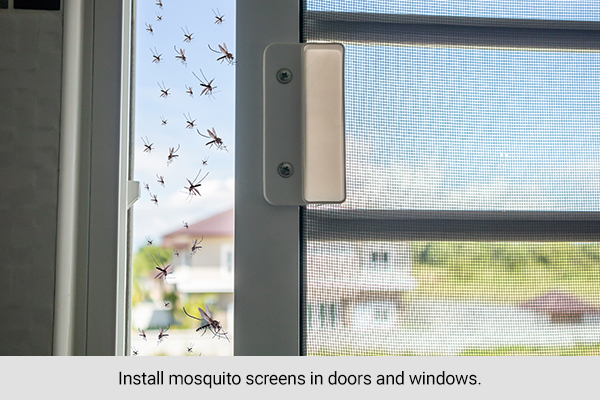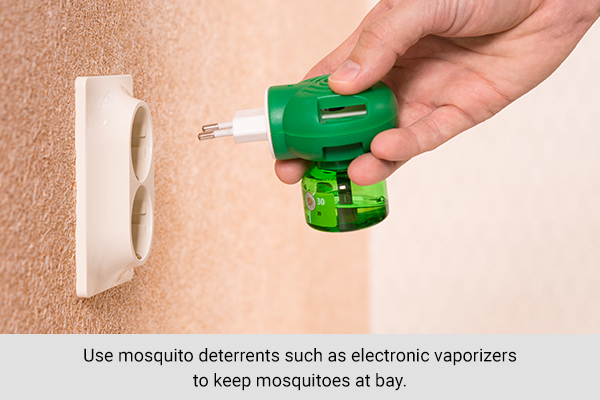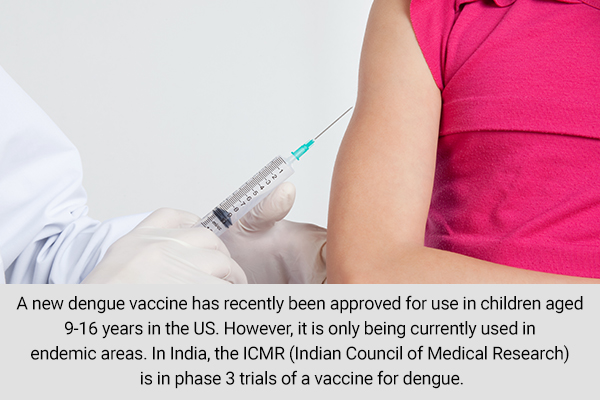In this article:
Dengue is a common viral infection in tropical and subtropical areas. It is spread by mosquito bites of the female Aedes mosquito.

Four closely related viruses may cause dengue fever, namely, DENV 1, DENV 2, DENV 3, and DENV 4.
While most cases of dengue infection are mild, a few cases may be severe and even fatal. It is a prominent cause of death in many Asian and Latin American countries.
Take a deeper look at the causes, symptoms, and prevention of the disease. (1)
Causes of Dengue Fever
Dengue fever is spread by four viruses transmitted by the female Aedes mosquito (Aedes aegypti and Aedes albopictus). (2) The mosquito becomes a vector for the disease if it bites an infected person as this virus enters its body. When this mosquito bites another person, it spreads the virus to them.
Aedes mosquitoes are commonly found in urban areas and breed in stagnant water such as in flower pots and water containers.
Signs and Symptoms of Dengue Fever
Symptoms of dengue may range from mild to severe depending on age, immunity, etc.
Most dengue cases in children and young people tend to be mild or moderate and resolve within a few days with medical intervention. Old or aged people and immunocompromised individuals may experience severe symptoms.
Here are a few signs and symptoms of dengue infection:

- High fever (which can go up to 105°F).
- Pain in different areas of the body: eyes, muscles, bones, etc.
- Mild nosebleed (3)
- Bruising very easily
- Nausea and vomiting
- Rash
Most of these symptoms tend to resolve within a week with proper treatment.
Some signs of severe infection include:
- Stomachache and abdominal tenderness
- Vomiting blood
- Extreme tiredness or irritability
Treatment for Dengue Fever
You should only try to treat mild symptoms of dengue at home. If you have severe signs of infection, it is better to go to the hospital for proper medical treatment.
- Rest as much as possible.
- Control the fever. You can take paracetamol every 6 hours to reduce fever. Do not take ibuprofen or aspirin.
- A sponge bath with cool water can help cool down the body.
- Prevent dehydration. Drink plenty of fluids to remain hydrated as dehydration can cause more complications and fatigue. (4)
Prevention and Control Against Dengue Fever

Preventive measures for dengue heavily depend on preventing mosquito bites and reducing mosquito populations in and around your surroundings.
Here are a few ways to achieve this:
- Dispose of garbage (especially wet waste) in and around the house properly. (5)
- Keep all water units covered and sanitized at all times.
- Spray insecticides such as DEET in your surroundings.
- Wear loose clothing that covers most of your skin to prevent mosquito bites
- Monitor vector populations in your area. (6)(7)
- Take extra precautions before stepping out at nighttime or early morning as these are peak active periods of mosquitoes.
If you live in an area with a high mosquito population, you may want to adopt the following measures to prevent mosquito bites:
1. Reduce mosquito habitats
Damp and dirty places are prime breeding spots for mosquitoes. Hence, leaving unwashed clothes, dishes, and dirty water around the house may result in mosquito infestations.
Keep your surroundings hygienic and well maintained at all times.
2. Stay in well-screened houses

Install mosquito screens on doors and windows. This can help keep mosquitoes out of your home. Make sure the screens have no holes, and spray mosquito repellent sprays on them occasionally.
3. Keep your house airy and well lit
Making sure your house receives lots of sunlight and is well lit can help prevent mosquitoes from breeding. Mosquitoes tend to breed in dark damp places.
4. Use mosquito repellent
Mosquito repellent creams can help prevent mosquito bites. One application may last for around 6 hours.
Do not apply mosquito repellent creams more than twice or thrice a day. Make sure to perform a patch test to prevent allergic reactions. (8)
5. Use mosquito deterrents

Use mosquito deterrents such as electronic vaporizers to keep mosquitoes at bay. Use natural insect repellents such as lemongrass or citronella oil sprays to repel them. You can also place cloves and orange peels around the house to deter mosquitoes. (9)
Diagnosing Dengue Fever
Dengue fever is diagnosed using the nucleic acid amplification test (NAAT), which is a laboratory test used to identify dengue in patients. NAAT should be performed on serum specimens collected 7 days or less after symptom onset.
Along with it, symptoms of dengue are typically easy to diagnose for doctors. The blood work report also shows leucopenia and thrombocytopenia in people with dengue fever. (10)
When to See a Doctor
Consult a doctor immediately if you experience:
- Bleeding from the nose or gums
- Blood in your vomit or stool
- Continuous vomiting (more than twice a day)
- Difficulty breathing
- Severe stomachache
Your doctor may ask you about your medical and travel history.
Most-Asked Questions About Dengue Fever
Is there a vaccine against dengue?

A new dengue vaccine has recently been approved for use in children aged 9–16 years in the USA. (11) However, it is only being currently used in endemic areas. In India, the Indian Council of Medical Research (ICMR) is in phase III trials of a vaccine for dengue. (12)
Can you get dengue only once?
You can get it all your life.
If you get COVID-19, will you not get dengue?
No, you can get both at the same time. Dengue fever can have dangerous complications such as dengue hemorrhage or shock syndrome.
Does dengue spread through physical contact?
Dengue spreads through mosquito bites only. It cannot spread through direct physical contact.
Final Word
Dengue fever is an infection spread by mosquitoes. It is more common in tropical climates where mosquito populations are abundant.
Most people with dengue tend to recover in a couple of weeks. In some cases, severe infections can cause prolonged illness. There is currently no vaccine for dengue. Hence, it is important to protect yourself from mosquito bites by using mosquito nets, mosquito repellents, and other methods.
Death usually of children from dengue fever is caused by thrombocytopenia.
- Was this article helpful?
- YES, THANKS!NOT REALLY


